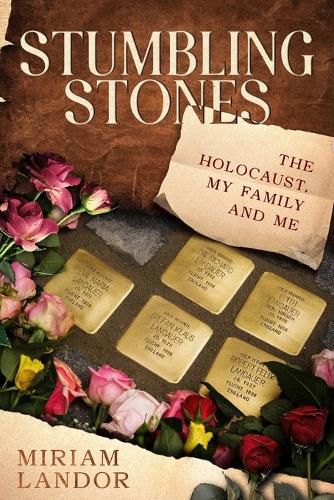Readings Newsletter
Become a Readings Member to make your shopping experience even easier.
Sign in or sign up for free!
You’re not far away from qualifying for FREE standard shipping within Australia
You’ve qualified for FREE standard shipping within Australia
The cart is loading…






This title is printed to order. This book may have been self-published. If so, we cannot guarantee the quality of the content. In the main most books will have gone through the editing process however some may not. We therefore suggest that you be aware of this before ordering this book. If in doubt check either the author or publisher’s details as we are unable to accept any returns unless they are faulty. Please contact us if you have any questions.
In this moving memoir, Miriam Landor shares her family's harrowing experiences of the Holocaust and the lasting impact this dark chapter of history had on the generations that followed.
Miriam was inspired to write Stumbling Stones after she started uncovering her father's story. He was the child of an assimilated Jewish family in Nazi Germany, experiencing the loss of family businesses, possessions, liberty and life as they knew it. The family fled to England, when her father was eleven, struggling to start a new life in wartime Britain. She also learnt the tragic fate of her great-grandparents who remained behind, including the truth about how her great-grandmother had died.
The book's title Stumbling Stones is inspired by Stolpersteine - memorials set into pavements which bear the name and details of people who were murdered by the Nazis, or who fled Germany to escape them. In her writing, Miriam reflects on the stumbling stones she has come across in her own life, including spending the first year of her life in and out of hospital. She also spent her childhood moving from one place to another, lacking somewhere her family could truly call home. By the time she turned eighteen, she had attended 10 different schools around the globe with no real idea of who she was or where she belonged.
In confronting the past, Miriam examines the shadow cast by the Holocaust on mental health both in her parents' generation and her own, seen through the prism of her career as a psychologist. Will learning about her family's strengths and stumbling stones help Miriam finally understand both what she has come from and who she can be?
$9.00 standard shipping within Australia
FREE standard shipping within Australia for orders over $100.00
Express & International shipping calculated at checkout
This title is printed to order. This book may have been self-published. If so, we cannot guarantee the quality of the content. In the main most books will have gone through the editing process however some may not. We therefore suggest that you be aware of this before ordering this book. If in doubt check either the author or publisher’s details as we are unable to accept any returns unless they are faulty. Please contact us if you have any questions.
In this moving memoir, Miriam Landor shares her family's harrowing experiences of the Holocaust and the lasting impact this dark chapter of history had on the generations that followed.
Miriam was inspired to write Stumbling Stones after she started uncovering her father's story. He was the child of an assimilated Jewish family in Nazi Germany, experiencing the loss of family businesses, possessions, liberty and life as they knew it. The family fled to England, when her father was eleven, struggling to start a new life in wartime Britain. She also learnt the tragic fate of her great-grandparents who remained behind, including the truth about how her great-grandmother had died.
The book's title Stumbling Stones is inspired by Stolpersteine - memorials set into pavements which bear the name and details of people who were murdered by the Nazis, or who fled Germany to escape them. In her writing, Miriam reflects on the stumbling stones she has come across in her own life, including spending the first year of her life in and out of hospital. She also spent her childhood moving from one place to another, lacking somewhere her family could truly call home. By the time she turned eighteen, she had attended 10 different schools around the globe with no real idea of who she was or where she belonged.
In confronting the past, Miriam examines the shadow cast by the Holocaust on mental health both in her parents' generation and her own, seen through the prism of her career as a psychologist. Will learning about her family's strengths and stumbling stones help Miriam finally understand both what she has come from and who she can be?